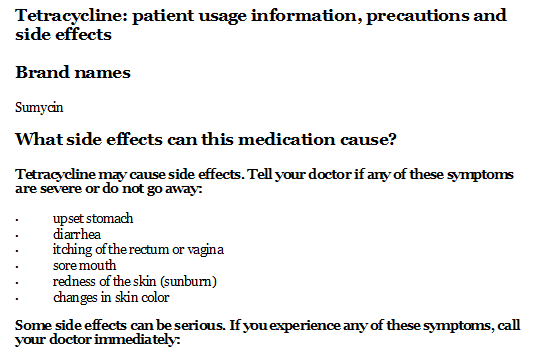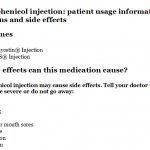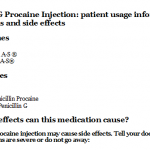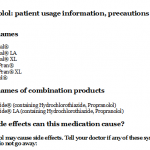
Tetracycline: patient usage information, precautions and side effects
Tuesday, May 30, 2017 by Gregory Van Dyke
http://www.naturalnewsreference.com/2017-05-30-tetracycline-patient-usage-information-precautions-and-side-effects.html

Tetracycline: patient usage information, precautions and side effects
Brand names
Sumycin
What side effects can this medication cause?
Tetracycline may cause side effects. Tell your doctor if any of these symptoms are severe or do not go away:
-
upset stomach
-
diarrhea
-
itching of the rectum or vagina
-
sore mouth
-
redness of the skin (sunburn)
-
changes in skin color
Some side effects can be serious. If you experience any of these symptoms, call your doctor immediately:
-
severe headache
-
blurred vision
-
skin rash
-
hives
-
difficulty breathing or swallowing
-
yellowing of the skin or eyes
-
itching
-
dark-colored urine
-
light-colored bowel movements
-
loss of appetite
-
upset stomach
-
vomiting
-
stomach pain
-
extreme tiredness or weakness
-
confusion
-
joint stiffness or swelling
-
unusual bleeding or bruising
-
decreased urination
-
pain or discomfort in the mouth
-
throat sores
-
fever or chills
If you experience a serious side effect, you or your doctor may send a report to the Food and Drug Administration’s (FDA) MedWatch Adverse Event Reporting program online (http://www.fda.gov/Safety/MedWatch) or by phone (1-800-332-1088).
Why is this medication prescribed?
Tetracycline, is used to treat bacterial infections, including pneumonia and other respiratory tract infections; acne; infections of skin, genital and urinary systems; and the infection that causes stomach ulcers (Helicobacter pylori). It also may be used as an alternative to other medications for the treatment of Lyme disease and for the treatment and prevention of anthrax (after inhalational exposure). Tetracycline is in a class of medications called tetracycline antibiotics. It works by preventing the growth and spread of bacteria. Antibiotics will not work for colds, flu, or other viral infections.
How should this medicine be used?
Tetracycline comes as a capsule and suspension (liquid) to take by mouth. It is usually taken two to four times daily. Tetracycline should be taken on an empty stomach, at least 1 hour before or 2 hours after meals or snacks. Drink a full glass of water with each dose of tetracycline. Do not take tetracycline with food, especially dairy products such as milk, yogurt, cheese, and ice cream. Follow the directions on your prescription label carefully, and ask your doctor or pharmacist to explain any part you do not understand. Take tetracycline exactly as directed. Do not take more or less of it or take it more often than prescribed by your doctor.
Shake the liquid well before each use to mix the medication evenly.
Other uses for this medicine
This medication is sometimes prescribed for other uses; ask your doctor or pharmacist for more information.
What special precautions should I follow?
Before taking tetracycline,
-
tell your doctor and pharmacist if you are allergic to tetracycline, minocycline, doxycycline, sulfites, or any other medications.
-
tell your doctor and pharmacist what prescription and nonprescription medicines, vitamins, nutritional supplements, and herbal products you are taking or plan to take, especially antacids, anticoagulants (‘blood thinners’) such as warfarin (Coumadin), and penicillin. Tetracycline may decrease the effectiveness of some oral contraceptives; another method of birth control should be used while taking this drug.
-
be aware that antacids, calcium supplements, iron products, and laxatives containing magnesium interfere with tetracycline, making it less effective. Take tetracycline 1 hour before or 2 hours after antacids (including sodium bicarbonate), calcium supplements, and laxatives containing magnesium. Take tetracycline 2 hours before or 3 hours after iron preparations and vitamin products that contain iron.
-
tell your doctor if you have or have ever had diabetes, allergies, asthma, hay fever, hives, or kidney or liver disease.
-
tell your doctor if you are pregnant, plan to become pregnant, or are breast-feeding. If you become pregnant while taking tetracycline, call your doctor immediately. Tetracycline can harm the fetus.
-
if you are having surgery, including dental surgery, tell the doctor or dentist that you are taking tetracycline.
-
plan to avoid unnecessary or prolonged exposure to sunlight and to wear protective clothing, sunglasses, and sunscreen. Tetracycline may make your skin sensitive to sunlight.
-
you should know that when tetracycline is used during pregnancy or in babies or children up to age 8, it can cause the teeth to become permanently stained. Tetracycline should not be used in children under age 8 unless your doctor decides it is needed.
What special dietary instructions should I follow?
Unless your doctor tells you otherwise, continue your normal diet.
What should I do if I forget a dose?
Take the missed dose as soon as you remember it. However, if it is almost time for the next dose, skip the missed dose and continue your regular dosing schedule. Do not take a double dose to make up for a missed one.
What should I know about storage and disposal of this medication?
Keep this medication in the container it came in, tightly closed, and out of reach of children. Store it at room temperature and away from excess heat and moisture (not in the bathroom). Throw away any medication that is outdated or no longer needed. Talk to your pharmacist about the proper disposal of your medication.
In case of emergency/overdose
In case of overdose, call your local poison control center at 1-800-222-1222. If the victim has collapsed or is not breathing, call local emergency services at 911.
What other information should I know?
Keep all appointments with your doctor and the laboratory. Your doctor will order certain lab tests to check your response to tetracycline.
Before having any laboratory test, tell your doctor and the laboratory personnel that you are taking tetracycline.
If you have diabetes, tetracycline causes false results in some tests for sugar in the urine. Check with your doctor before changing your diet or the dosage of your diabetes medicine.
Do not let anyone else take your medication. Your prescription is probably not refillable. If you still have symptoms of infection after you finish the tetracycline, call your doctor.
It is important for you to keep a written list of all of the prescription and nonprescription (over-the-counter) medicines you are taking, as well as any products such as vitamins, minerals, or other dietary supplements. You should bring this list with you each time you visit a doctor or if you are admitted to a hospital. It is also important information to carry with you in case of emergencies.
Why is this medication prescribed?
How should this medicine be used?
What special precautions should I follow?
What special dietary instructions should I follow?
What should I do if I forget a dose?
What side effects can this medication cause?
What should I know about storage and disposal of this medication?
Tagged Under: Tags: chemical medicine, medication, Pharma, Prescription Medicine





